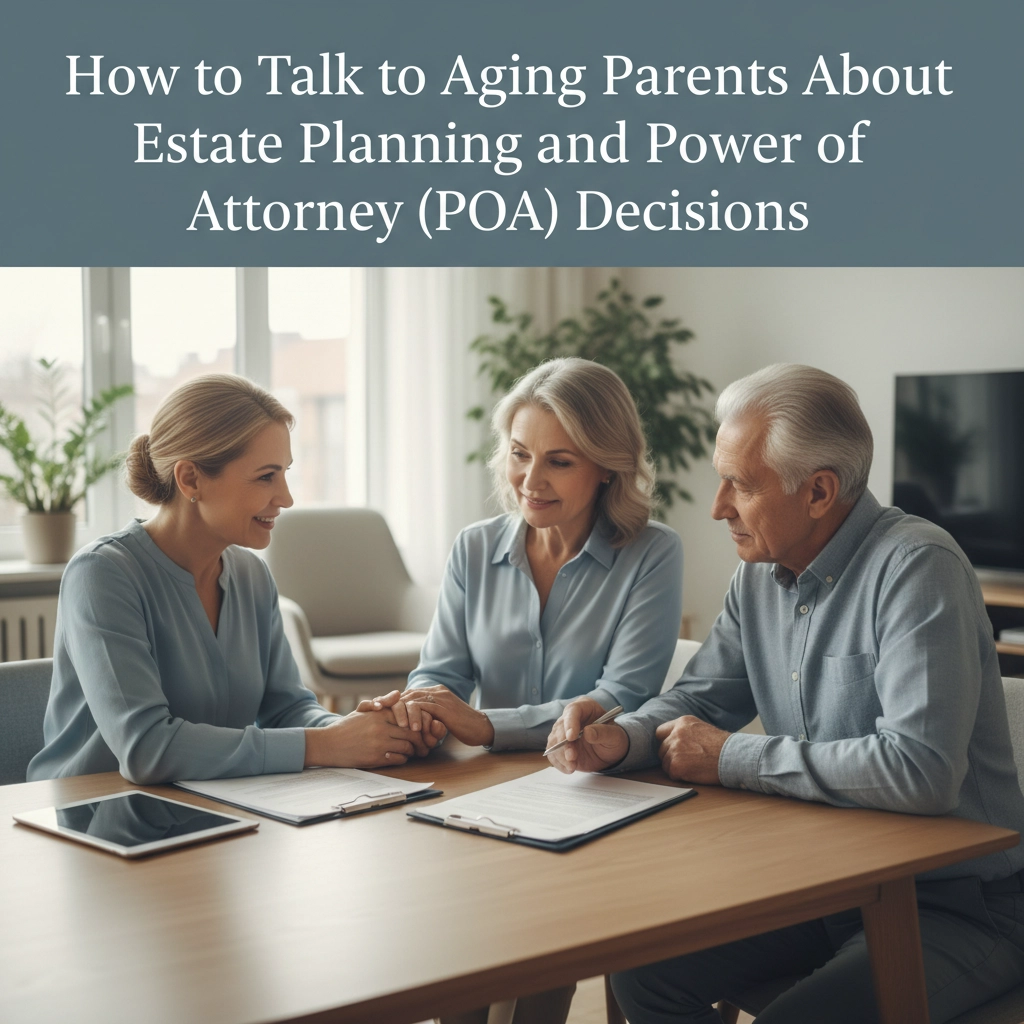How to Talk to Aging Parents About Estate Planning and Power of Attorney (POA) Decisions
From Randy Molnar - Founder RightSize Your Life Services

Ready to explore your options in rightsizing your life? Book your RightSize Your Life Consult
Your mom just turned 78, and she's still fiercely independent. But last week, she forgot to pay the hydro bill: something that's never happened before. Your heart sank as you realized the conversation you've been dreading can't wait any longer.
The Family Dilemma Nobody Talks About
Most families find themselves in this exact situation: watching parents age while tiptoeing around the elephant in the room. You want to help, but bringing up estate planning feels like you're rushing them toward the end. Mentioning power of attorney sounds like you're trying to take control of their lives.
The truth? Your parents are probably thinking about these things too: they just don't know how to bring it up either.
Why This Conversation Matters for Your Family Home
Estate planning isn't just about wills and bank accounts. For most families, the home represents their largest asset and deepest emotional investment. Without proper planning, that beautiful family home in Erin Ontario or Milton could become a source of stress instead of security.

Consider what happened to the Johnson family: when dad passed unexpectedly, mom couldn't afford the upkeep on their 4-bedroom home, but the estate was tied up in probate for 18 months. She couldn't sell, couldn't renovate, and couldn't make decisions about rightsizing your life when she needed to most.
Starting the Conversation Without the Awkwardness
Pick the right moment. Don't ambush them during Sunday dinner or when they're stressed. Instead, try these natural conversation starters:
- "I'm updating my own will: how did you handle these decisions when you were my age?"
- "The Smiths just moved to that lovely retirement community: have you ever thought about what you'd want if maintaining the house became too much?"
- "I read that most people don't have power of attorney arranged. Should we make sure our family is prepared?"
The key is framing it around their wishes and comfort, not your timeline or concerns.
The Home Factor: What Are Your Options?
When discussing estate planning, the family home often becomes the central focus. Here are the most practical housing solutions that align with estate planning goals:
Rightsizing Before It's Necessary
Many parents resist downsizing because they see it as giving up independence. Reframe it as rightsizing your life: choosing a home that matches your current lifestyle and future needs. Homes for sale in Erin Ontario often include maintenance-friendly options perfect for this transition.
The conversation: "What would your ideal home look like if you could design it for the next 20 years? Fewer stairs? Less yard work? Closer to amenities?"
Co-Ownership Arrangements
Some families explore joint ownership, where adult children become co-owners of the family home. This can help with:
- Tax planning strategies
- Ensuring the home stays in the family
- Providing security for parents who want to age in place
Important: This requires careful legal guidance to avoid unintended tax consequences.
Creating Additional Income Streams
If parents want to stay put, consider whether their property could accommodate:
- A basement apartment for rental income
- An accessory dwelling unit (garden suite) for family members
- Roommate arrangements for companionship and financial support

Power of Attorney: The Conversation That Changes Everything
POA discussions often trigger the most family drama. Here's how to navigate it:
Address the fear directly: "This isn't about taking away your independence: it's about making sure someone you trust can help if you need it."
Involve everyone: If you have siblings, include them in the conversation. Surprises about who's chosen as POA can create lasting family rifts.
Consider professional help: Sometimes parents are more receptive to guidance from their lawyer, financial advisor, or doctor than from their children.
Making the Home Part of the Estate Plan
Your parents' home isn't just an asset: it's often their security blanket. Address these common concerns:
"What if I need to sell to pay for care?" Discuss options like reverse mortgages, home equity lines of credit, or selling to family members with life estates.
"I want the house to stay in the family." Explore trusts, transfer-on-death deeds, or gradual ownership transfers that accomplish this goal while minimizing taxes.
"What if I can't maintain it anymore?" Plan for home modification funding, property management services, or transition strategies to suitable alternatives.

When Professional Help Makes Sense
Some conversations need expert guidance:
- Estate planning attorney: For wills, trusts, and POA documents
- Financial advisor: For tax implications and retirement planning
- Real estate professional: For property valuations and market timing
- Elder care specialist: For navigating care options and costs
Don't try to handle everything yourself: and reassure parents that consulting professionals protects everyone's interests.
Red Flags That Mean Time Is Running Short
Watch for signs that planning can't wait much longer:
- Increasing forgetfulness with financial matters
- Physical challenges with home maintenance
- Isolation due to transportation issues
- Avoiding discussions about the future entirely
These aren't failure signs: they're normal parts of aging that smart planning can address.
Making It a Family Partnership
The most successful estate planning conversations happen when parents feel like partners, not patients. Ask questions like:
- "What's most important to you about your legacy?"
- "How can we support the life you want to live?"
- "What are you worried about that we haven't discussed?"
Listen more than you talk. Their answers will guide better decisions than any assumptions you might make.

Taking the Next Steps Together
Start small. Maybe the first step is just organizing important documents or scheduling a consultation with their current lawyer. Perhaps it's exploring what rightsizing your life could look like in their favorite neighborhood.
Remember: this isn't a one-time conversation. Estate planning evolves as circumstances change, and your family's needs will shift over time too.
The Peace of Mind Factor
When families complete estate planning: including home-related decisions: everyone benefits. Parents gain confidence that their wishes will be honored. Adult children have clarity about expectations and responsibilities. And that family home? It becomes part of a thoughtful legacy instead of a source of stress.
The conversation might feel awkward at first, but the alternative: scrambling to make major decisions during a crisis: is far worse for everyone involved.
Ready to explore housing options that support your family's long-term planning? Contact Randy Molnar MOD Realty to discuss how the right home can fit into your estate planning strategy. We understand the connection between life transitions and housing decisions.
Whether your parents are considering rightsizing your life, exploring homes for sale in Erin Ontario, or planning for aging in place, the right housing strategy supports their estate planning goals and your family's peace of mind.
Don't wait for a crisis to have these conversations. Your future self: and your parents( will thank you for starting today.)





![Your Home Buyer Wants To Extend The Closing Date—What Now? [PART 2]](https://images.squarespace-cdn.com/content/v1/65d905a3f2e1497823cc3a82/1764096611270-AYV78LE6U48LKY6TUZRM/banner.jpg?format=200w)

